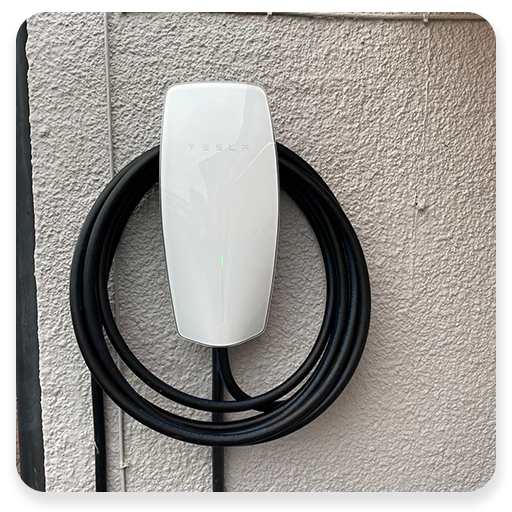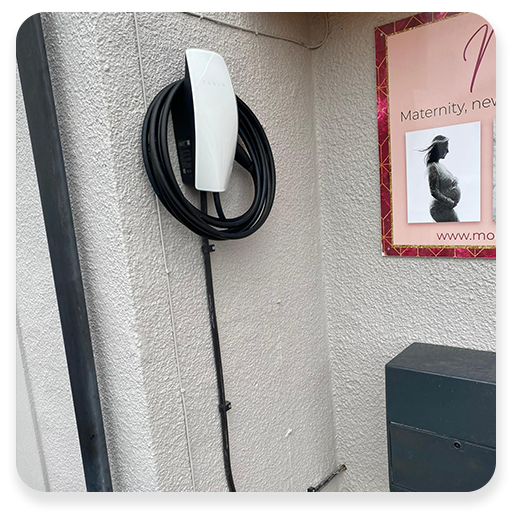EV Car Charging


Everything you need to know about electric car charging
We know that the world of electric car chargers can be daunting, with lots of different information out there to read and digest. Regardless of whether you’re fitting an electric vehicle charger in a residential or commercial setting, you’ll need to know things like which type of EV charger is best for your installation, whether or not to choose a tethered or untethered charger, how much power an EV charger draws, the type of cabling needed, what government grants you can get, and much more.
Our customers often need advice and guidance on their electric car charger installation, so we explore most frequently asked questions below.
EV Car Charger FAQ
Which home EV charger should you choose?
Home electric car chargers fall into 2 categories; Trickle chargers and AC chargers.
A trickle charger plugs into the mains supply using a standard, 220v 3-pin plug on one end. A trickle charger can deliver anywhere between 8-10 miles of range to the battery per hour. They are not overly practical unless you only drive short distances every day, or top-up every night as it can take anywhere from 12 – 24 hours to fully charge a battery pack.
AC chargers (sometimes known as Wallboxes) are a much better option for most EV owners and are often installed in homes, offices, and other commercial settings. These electric car chargers have power outputs of 3.7kW or 7kW. The latter will charge most EVs from empty to full range in around 8-10 hours.
Commercial settings with a 3-phase power supply can also install 22kW electric car chargers with even quicker charge times, these are known as DC chargers.
What is an EV fast charger?
An EV fast charger is an electric car charger that can charge your car’s battery from empty to nearly full in around 40 minutes. These EV charging solutions are in public places (such as motorway service stations or dealerships) and using DC, deliver anywhere from 50kW to 200kW of power. Due to their very high installation cost and power consumption, they are not economical for homes or most workplaces.
How much does an electric car charger cost?
Home or workplace electric car chargers can vary in price but they typically start at around £400 to £500 and can go up to £4000 depending on power output and features etc.
If you only use public and paid chargepoints, you could save in the region of £1000 over a year with a home chargepoint. Despite the initial costs, they often pay for themselves quite quickly.
Are electric car chargers standardised?

TYPE 1
POWER RATINGS: 3.3kW & 7kW
- Standard US & Asia connector
- 5 pin design
- No locking mechanism
- More common on older EVs

TYPE 2
POWER RATINGS: 3.3kW, 7kW & 22kW (3-phase)
- Most common fitting for new EVs
- Considered the standard for the European market
- 7 pin design
- Can work with 3-phase power
- Has locking mechanism
- Can work with Tesla Superchargers
What is a tethered electric car charger?
The other big distinction between EV chargers is whether they’re tethered or untethered. A tethered electric car charger has an integrated charging cable. In simple terms, that means the cable is permanently attached to the wallbox.
An untethered electric car charger has a socket in which you plug the charging cable into, much like a camping socket. we install both types of EV charger to suit your needs.
Should I choose a tethered or untethered EV charger?
Tethered and untethered electric vehicle chargers each have their pros and cons.
Pros of tethered chargers
- Tethered electric chargers allow you to simply park up and plug in.
- You can keep your other charging cable in the boot of your car
- More secure than an untethered unit
- You don’t need to buy an additional cable
Cons of tethered chargers
- Cables often come in fixed lengths, so you can’t buy a replacement if needed.
- They lock you into the Type 1/Type 2 choice. If you change car, or even if a new cable standard emerges, you’ll need to buy a new charger or an adapter.
- They aren’t as ‘neat’. The cables are permanently on display and you’ll have to coil/uncoil every time you use it.
Pros of untethered chargers
- You can buy multiple cables of different lengths
- Much more flexible and future-proofed, you are not as locked into the Type 1/Type 2 choice, either type can use the socket.
- As EVs become more popular, visiting friends and family can also use the charger.
- Looks a lot more discreet and tidy on your driveway or car park.
Cons of untethered chargers
- You have to get the cable out of your boot/garage every time you want to charge
- Less secure than a tethered unit
- You may have to supply your own charging cable
How much does it cost to install an electric car charger?
Electric car chargers need to be installed by a professional electrician or an OLEV approved installer, and there are associated costs with this. A professional installer will be able to tell you whether you need permission to install your EV charger, whether your home or commercial property is safe, and where is best to place the EV charging unit itself.


WE UNDERSTAND CAR CHARGING AT HOME MAY BE CONFUSING SO IF YOU HAVE ANY QUESTIONS OR WANT TO FIND OUT HOW ECES CAN HELP WITH EV CAR CHARIGING GET IN TOUCH TODAY !
Customer Reviews

